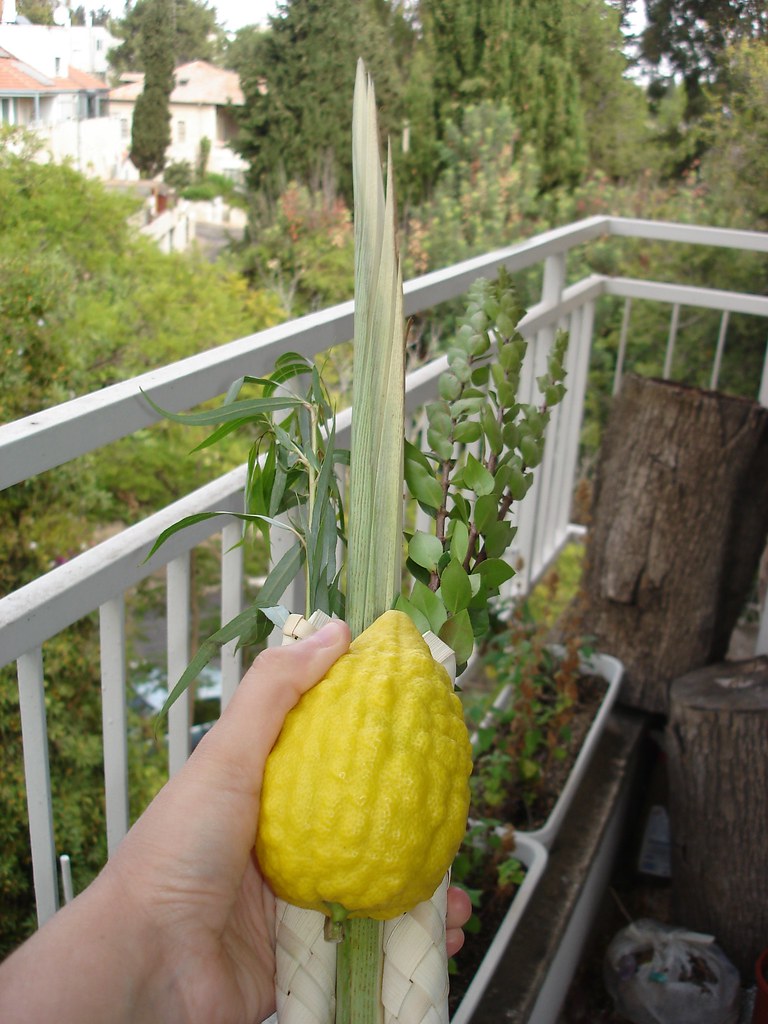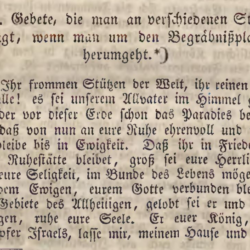| Source (German) | Translation (English) |
|---|---|
Gebet für den Verstorbenen, nachdem man Ẓiduḳ hadin gesagt hat. |
Prayer for the deceased after saying “Tsiduq hadin.” |
Es sei dir wohlgefällig, Ewiger, Gott aller Seelen, daß du die Seele des (der Name des eben Beerdigten) mit Liebe aufnehmest. |
May it be pleasing to you, Eternal One, God of all souls, that you receive the soul of (the name of the one who has just been buried) with love. |
Sende ihm Engel deiner Güte entgegen, seine Seele nach dem Eden zu leiten, wie du einst unserem Urvater Jakob gesendet hast. So heißt es in der Schrift: „Und Jakob reisete seines Weges, da begegneten ihm Engel des Himmels. Und als Jakob sie sah, sprach er: das ist eine göttliche Schaar, und nannte den Namen des Ortes Machnaim.” (1 Mose 32, 2-3) |
Send to him angels of your goodness to guide his soul to Eden, as you once sent to our forefather Yaaqov. Thus it says in the Scripture: “And Yaaqov was traveling on his way, when angels of heaven met him. And when Yaaqov saw them, he said, ‘This is a divine host,’ and called the name of the place Maḥanaim.” (Genesis 32:2-3) |
Möge sich an ihm bestätigen was die Schrift lehrt: „Die auf Gott hoffen, gewinnen neue Kräfte, erheben wie Adler ihren Flug, laufen ohne zu ermüden, gehen ohne zu ermatten.” (Jesaja 40, 31) |
May it be confirmed in him what the Scriptures teach: “Those who hope in God gain new strength, lift up their flight like eagles, run without tiring, walk without growing weary.” (Isaiah 40:31) |
Verfahre mit ihm nach deiner unendlichen Barmherzigkeit; erfreue seine Seele mit dem unendlichen Gute, das den Frommen aufbewahrt ist; seine Seele bleibe im Bunde der Lebenden, mit den Seelen aller, die hier im Staube schlafen, mit den Seelen aller frommen Männer und Frauen in den Gefilden der Seeligkeit. Amen. |
Deal with him according to your infinite mercy; gladden his soul with the infinite good stored up for the pious; let his soul abide in the union of the living, with the souls of all who sleep here in the dust, with the souls of all pious men and women in the realms of bliss. Amen. |
“Gebet für den Verstorbenen, nachdem man Ziduk hadin gesagt hat” was translated/adapted by Yehoshua Heshil Miro and published in his anthology of teḥinot, בית יעקב (Beit Yaaqov) Allgemeines Gebetbuch für gebildete Frauen mosaischer Religion. It first appears in the 1835 edition as teḥinah №101 on pp. 199-200.
We welcome corrections and improvements. The transcription of the German from Latin script in Fraktur type provided machine-readable text for a machine translation by DeepL, which we then edited for accuracy and clarity. –Aharon Varady
Source(s)


“Gebet für den Verstorbenen, nachdem man Ẓiduḳ hadin gesagt hat | Prayer for the deceased after saying “Tsiduq hadin,” a teḥinah by Yehoshua Heshil Miro (1835)” is shared through the Open Siddur Project with a Creative Commons Attribution-ShareAlike 4.0 International copyleft license.


![Fürbitte für die Verstorbenen [no.1] (Yehoshua Heshil Miro 1835) - cropped](https://opensiddur.org/wp-content/uploads/2022/03/Furbitte-fur-die-Verstorbenen-no.1-Yehoshua-Heshil-Miro-1835-cropped.png)
![Fürbitte für die Verstorbenen [no.3] (Yehoshua Heshil Miro 1833) - cropped](https://opensiddur.org/wp-content/uploads/2022/03/Furbitte-fur-die-Verstorbenen-no.3-Yehoshua-Heshil-Miro-1833-cropped.png)






Leave a Reply